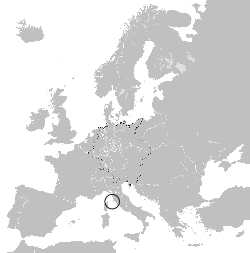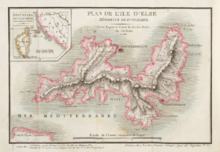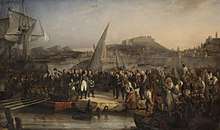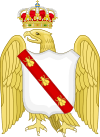Principality of Elba
The Principality of Elba (Italian: Principato d'Elba) was a non-hereditary monarchy established by the Treaty of Fontainebleau on 11 April 1814. It lasted less than a year, and its only head was Napoleon.
Principality of Elba Principato d'Elba | |||||||||
|---|---|---|---|---|---|---|---|---|---|
| 1814–1815 | |||||||||
 Location of the Principality of Elba within Europe | |||||||||
| Capital | Portoferraio | ||||||||
| Common languages | Italian, Elbano dialect | ||||||||
| Religion | Roman Catholic | ||||||||
| Demonym(s) | Elban | ||||||||
| Government | Non-hereditary monarchy | ||||||||
| Sovereign of Elba | |||||||||
• 1814–1815 | Napoleon | ||||||||
| Governor of Elba | |||||||||
• 1814–1815 | Antoine Drouot | ||||||||
| Historical era | Napoleonic Wars | ||||||||
| April 13, 1814 | |||||||||
| February 26, 1815 | |||||||||
| June 9, 1815 | |||||||||
| Area | |||||||||
| 1814 | 224 km2 (86 sq mi) | ||||||||
| Population | |||||||||
• 1814 | 12,000 | ||||||||
| Currency | Tuscan lira | ||||||||
| |||||||||
Formation

Sovereignty over the island, which until then had been part of the French département of Méditerranée, was given to Napoleon I of France after his abdication following the War of the Sixth Coalition. Article 3 of the treaty stipulated that Elba was to be "an independent principality possessed by him in complete sovereignty and as personal property".[1] His rule was to persist until his death, at which point control of the Principality would return to Tuscany. The former emperor was also granted a stipend of two million francs per year to be paid by France.
Napoleon's government
Upon Napoleon's landing on the island, the Mayor of Portoferraio, Pietro Traditi, presented the keys to the city to the emperor. After which, Napoleon begun work as sovereign of the island, starting by writing a small, three-paged constitution, outlining five government departments: the departments of civil administration, the communes, the domains reserved for the emperor, the imperial palace, and the army.
General Henri Gatien Bertrand was appointed grand marshal of the palace, a post he held during Napoleon's reign in France, and was in charge of the civil administration. General Antoine Drouot was appointed governor of the island and charged with military matters, Giuseppe Balbiani was named intendant general of police, and Guillaume-Joseph Roux was made treasurer. Napoleon created a conseil souverain (Sovereign's Council), seating on the council was twelve members: four Frenchmen and eight Elbans. Five councillors were made members of the court of first instance, with Balbiani as President. The remaining members of the Sovereign's Council were placed on the court of appeal, without any presiding head. However, despite the power held by the council, most government power was vested in the four French ministers brought from the former regime, and Napoleon himself who took an extremely active role in governing the principality.
As Sovereign of Elba, Napoleon went about modernizing the island by carrying out a series of economic and social reforms to improve the quality of life such as overseeing the construction of new roads and bridges, developing the iron mines, issuing decrees on modern agricultural methods, organizing regular trash collections, providing towns with water (as Elba was notorious for its summer droughts), setting up a corps of firemen, and overhauling the island's legal and educational system. His reforms went down to the smallest detail such as rebuilding the latrines in Portoferraio and even passing a law prohibiting children from sleeping more than five to a bed.
Military
As allowed by the Treaty of Fontainebleau, Napoleon brought 870 men to the island with him from France. The army was made up of 566 from the elite Garde Impériale (both infantry and cavalry) and the remaining 300 were from a small battalion of grenadiers. The army was under the supervision of General Drouot and commanded by General Cambronne and the staff headquarters. The navy consisted of 66 men and one ship: the double-masted, 18-gunned brig, Inconstant. A small flotilla of two other sloops also accompanied Inconstant. The fleet was first commanded by Lieutenant Taillade; however, after nearly losing Inconstant in a storm, Taillade was replaced by lieutenant J. Chautard, who would later ferry Napoleon back from Elba in 1815. Paoli Filidoro was appointed Captain of the Gendarmerie and operated under Giuseppe Balbiani as Intendant General. The combined armed forces by 1815 on Elba numbered about 1,000 men, costing over half of the island's treasury to pay, equip, and feed.
Dissolution

On 26 February 1815, after ruling Elba for nearly 10 months, Napoleon escaped from the island and landed in southern France to retake power, beginning the War of the Seventh Coalition. After his defeat at the Battle of Waterloo, Napoleon was transported by Britain to the island of Saint Helena where he remained a prisoner until his death in 1821. At the Congress of Vienna, sovereignty of the island was returned to the Grand Duchy of Tuscany.
In film
The 2006 comedy Napoleon and Me is set during the Napoleonic rule of Elba.
References
- Gruyer, Paul (1908). Napoleon, King of Elba. London: William Heinemann.

